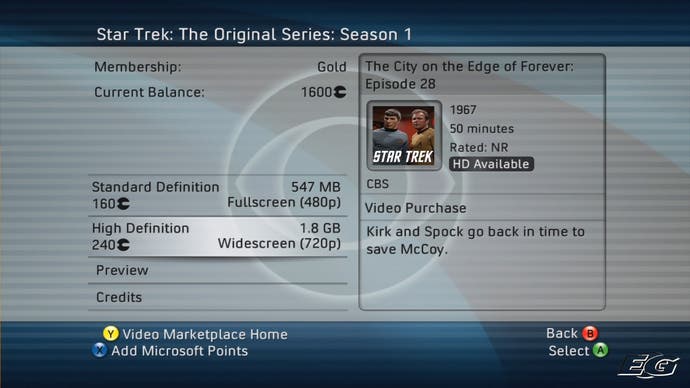Home Videos
Xbox Live Video Marketplace dissected.
Enterprise (HD)
Click here for screenshot gallery
Suitably taken aback by the sheer quality of the original Star Trek, it was time to put it up against its modern successor, Enterprise. All of season one is available in HD, and while it's deeply average entertainment overall, it was shot in HD with some fairly ambitious CG, so hopes were high that we'd see an improvement over the '60s Trek. I downloaded the pilot episode as a sample.
Astoundingly, I actually found it to be a whole lot worse. While still being a respectable leap over DVD, it looks soft and unfocused next to the Original Series, and the difference in clarity between the film and effects shots is blatantly obvious. Bearing in mind the quality of the Original Series, this shows how important the original source has to be in getting a great quality transfer. Enterprise seems to have been a little let down in this regard.
Batman Forever (SD)
Click here for screenshot gallery
One of the most disappointing aspects of Microsoft's video service is just how little content is actually available in high definition. At the time of writing, of the 55 movies available, only seven could be downloaded in HD. But with the higher resolution files taking so long to download, the lower quality SD transfers look appealing, weighing in at a modest 1.5GB for a two-hour movie. If the idea of the new Live Video Marketplace is to offer video on demand, SD is obviously the best vehicle to do this with minimal download times. Therefore, in many respects, SD delivery is more important than high definition.

By and large, the VC-1 codec acquits itself well with lower resolution footage, with a quality level that's easily superior to the 1.4GB XviD DVD rips that populate 'the usual sources'. It's not all roses though and Batman Forever is a good example. While the movie itself is generally of an excellent quality considering the file size, the introductory credits sequence is a terrible, macro-blocking nightmare - and again, similar to the HD versions of Star Trek, this effect seemed amplified with component output and lessened somewhat using VGA.
The real surprise here is how good the 360's internal scaler performs when viewing this stuff on an HDTV. Deficiencies in the image are smoothed out (all the screenshots we've taken of the HD and SD material are 720p), and the overall effect isn't a million miles away from watching a satellite broadcast. However, quality is some way short of watching from DVD.
Studio 60 on the Sunset Strip (SD)
Click here for screenshot gallery
Microsoft's content deals for the Live Video Marketplace are really impressive, with just about all of the major studios having some kind of presence. Unlike the movie side of things, there's also an enviable amount of HD content in the TV domain, making these downloads appealing. However, it was somewhat bizarre to see NBC's generally excellent new show, Studio 60 on the Sunset Strip, only available as an SD download, weighing in at around 500MB per episode. That's midway between the 350MB and 700MB XviD 'standards' pirates employ for their versions, and quality-wise, that's pretty much exactly what you're getting for your 160 Microsoft Points.

The screenshot gallery speaks for itself - quality is generally fine but unremarkable (something of a shame considering how beautifully shot Studio 60 tends to be) and unless you want to splash the cash to catch up on an episode you may have missed on transmission, it's hard to imagine that people would spend their points like this on each and every episode. Even if one episode of a typical US TV series were just a singular English pound to purchase, a whole season would work out little cheaper than a DVD boxset, which isn't really good enough for a video that isn't as 'portable' and is some way short of DVD quality.
As a glimpse into the future, the Xbox Live Video Marketplace is highly intriguing. Although generally pricey, the HD stuff is basically superb, and while the SD material is passable enough for a casual viewing (i.e. a movie rental), Microsoft needs to aim for DVD quality (at least) if its TV show episodes are to become a legal alternative to the HDTV-derived XviD encodes that typically pop up online within 24 hours of an episode airing.
The question also remains as to whether the 360 really is the right platform for this enterprise. Even if I wiped my hard disk completely, I'd only be able to retain five Star Trek HD episodes that supposedly I own outright. A bigger hard disk is certainly a good start, but Microsoft has to look beyond this. As a company it's been pushing hard for 'managed copy' on HD-DVD - the process whereby a movie can be transferred to other devices for viewing. Obviously that's what's required here too. These Live Marketplace files are essentially WMV files that could - and should - work on our PCs (and maybe Zunes?).

At the very least we should be allowed to archive the shows we've bought onto external hard disks and USB flash media, or even burn them to DVD-R. The alternative is to ditch the current pricing structure in favour of an all-access monthly subscription which might work out better considering the storage and playback limitations currently in place.
What we have here is definitely a work-in-progress and an exciting one at that as Microsoft propels its games platform into a whole new territory. Most fascinating of all is how seriously the company is taking the 360's media-playing capabilities now PS3 has launched - to the point where key Microsoft decision makers are canvassing opinion on enthusiast AV sites such as the AVSForum, and even taking advice from the hardcore rippers and encoders that populate the Doom9 video backup site. Right now they're polling video encoding enthusiasts on what file formats to support in future dashboard upgrades, with XviD and H.264 playback looking ever more likely. Ironically, with this level of dedication in getting its media player up to snuff, it might actually transpire that the Live Video Marketplace's fiercest competition ends up coming from Usenet and Bittorrent.
